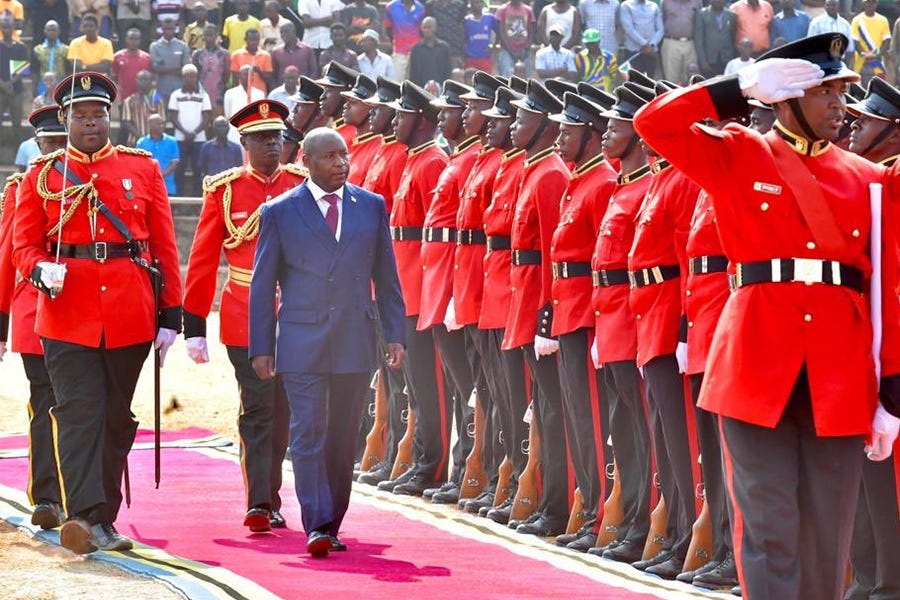Ping pong Diplomacy: How Burundi is responding to Rwanda‘s “hidden serves”?
RegionWeek Newsletter Vol III, Issue #126 | Saturday, September 19, 2020
This is a new version of the RegionWeek Newsletter for the 3rd season( July-December 2020). The content targets Business leaders, Decision-makers, and Young professionals with interests in Burundi and East Africa. Subscribe to stay productive, and competitive in a pandemic and disrupted season.

Dear Readers,
This Saturday, September 19, 2020, President Evariste Ndayishimiye was in Tanzania, on a one-day official visit at the invitation of the President of the United Republic of Tanzania John Magufuli. This is the first official visit by President Evariste Ndayishimiye since taking office.
During the visit, President Magufuli confirmed the talk with President Ndayishimiye focused on the possibility to allow Burundi minerals to trade in the Kigoma market as well as building a joint nickel smelting factory. The volume of trade between Burundi and Tanzania is about Sh 201 billion currently, according to President Magufuli.
"We will talk about the relations between our countries which are not only neighbors but also the people are relatives," said Magufuli at the ceremony.
This was a very busy week for diplomats and lobbyists in the region. In this article let us explore the recent moves made by Burundi to navigate the regional diplomatic zone.
A crazy week filled with rumors
Those who follow unofficial news sources certainly came across rumors that, since last Monday evoked a high-level negotiation session between Rwanda and Burundi on the “Key actors in the failed coup of 2015 hosted by Rwanda”, RegionWeek checked the allegation and found no compelling facts to confirm this information till this day.
That was not the only rumor around, after Burundi politely declined the invitation to attend a mini-summit organized by DRC and Rwanda, it was reported that some diplomatic missions tried to convince Burundi to reconsider its position. On the other hand, we heard a bunch of crazy analyses of why Burundi refused to attend.
READ ALSO: Contours of a New Diplomatic Wave in Burundi
“Heel-and-toe shifting” technique
A heel-and-toe downshift refers to a specific technique used to downshift a manual transmission car. The heel-and-toe downshift offers the benefits of reduced vehicle wear-and-tear, better driver control, and faster lap times on a racetrack.
Political analysts acknowledge that Burundi and DRC experienced good relations for many years, but the rapprochement of Kinshasa and Kigali regime last year raised suspicions among Gitega hardliners.
The urgent need to organize a summit was seen by commentators as proof that DRC changed its positions on some bilateral interests, especially after the Death of President Nkurunziza. Experts saw a Mini-Summit designed to redistribute regional strategic cards, and analysts agree on the fact that Burundi would have been the ultimate loser in a game that started in his absence.
The government of Burundi officially announced that its priority would be the organization of a bilateral meeting at the ministerial level to discuss with the DRC the management of security challenges at the common borders and ways to promote trade between the two countries.
Burundi seems to use Heel-and-toe shifting in his diplomacy, downshifting before entering a turn in order to eliminate the jolt to the drivetrain, or any other unwanted dynamics.
READ ALSO: Rwanda and Burundi make positive steps in easing tensions but challenges remain
Burundi responses to “hidden serves”
In a ping pong game, a “hidden serve” is an illegal act of hiding the ball from your opponent when you serve. A player uses their upper body or arm to hide the contact with the ball. This makes it very hard for their opponents to see what type of spin is on the ball.
In a session of interactions with social media users, Rwandan President Paul Kagame said that his country was ready to work with Évariste Ndayishimiye, a statement that was interpreted as a “hidden serve”, made to a new player who just joined the game table.
Some analysts go far to say that the Goma Mini-Summit, was a new kind of “hidden serve” made by Rwanda, with DRC as “upper body to hide the contact with the ball”. On the other hand, sober analysts think the real question should be “ What is at stake in this sudden interest in resolving regional conflicts?” (the spin on the ball)
Burundi has adopted its own rhythm and a wayward sense of priority. Burundi is often said to be diplomatically isolated. But the most eloquent aspect of this situation is how Burundi is continuously adopting a serene and cheerful diplomatic approach.
According to Ping pong experts, if you are not sure what spin is on the ball, contacting the ball later gives you more time to watch the ball trajectory and try to approximate the spin on the ball and to have a little better control on the serve return.
Will this strategy bear fruit? wait and see!
Thanks for reading
Fabrice Iranzi, RegionWeek.com
Support RegionWeek Newsletter!
Contribute at least $5/Month, and join our amazing community of supporters!
RegionWeek is a Burundi-based media for a new generation of achievers in Africa, a platform devoted to chronicling the journey to Freedom and Empowerment.



